Treating Major Depressive Disorder: Non-Pharmacological Approaches
VerifiedAdded on 2023/01/10
|10
|2619
|27
Essay
AI Summary
This essay delves into the realm of Major Depressive Disorder (MDD), also known as clinical depression, highlighting its significant impact on various aspects of a person's life. It explores the effectiveness of non-pharmacological therapies, specifically Mindfulness-based cognitive therapy (MBCT) and Interpersonal therapy (IPT), as viable treatment options. The essay provides a detailed explanation of MBCT, emphasizing its use of meditation and mindfulness practices to help patients manage negative thoughts and prevent the recurrence of depression. It also describes Interpersonal therapy (IPT) as a time-restricted, evidence-based approach that focuses on improving the patient's social and personal relationships to alleviate depressive symptoms. Furthermore, the essay outlines the crucial role of mental health nurses in administering these therapies, including their responsibilities in patient assessment, building therapeutic relationships, providing therapy sessions, and monitoring patient progress. The essay concludes by emphasizing the efficacy of these non-pharmacological approaches, highlighting their potential to improve both the mental and physical well-being of individuals suffering from MDD.
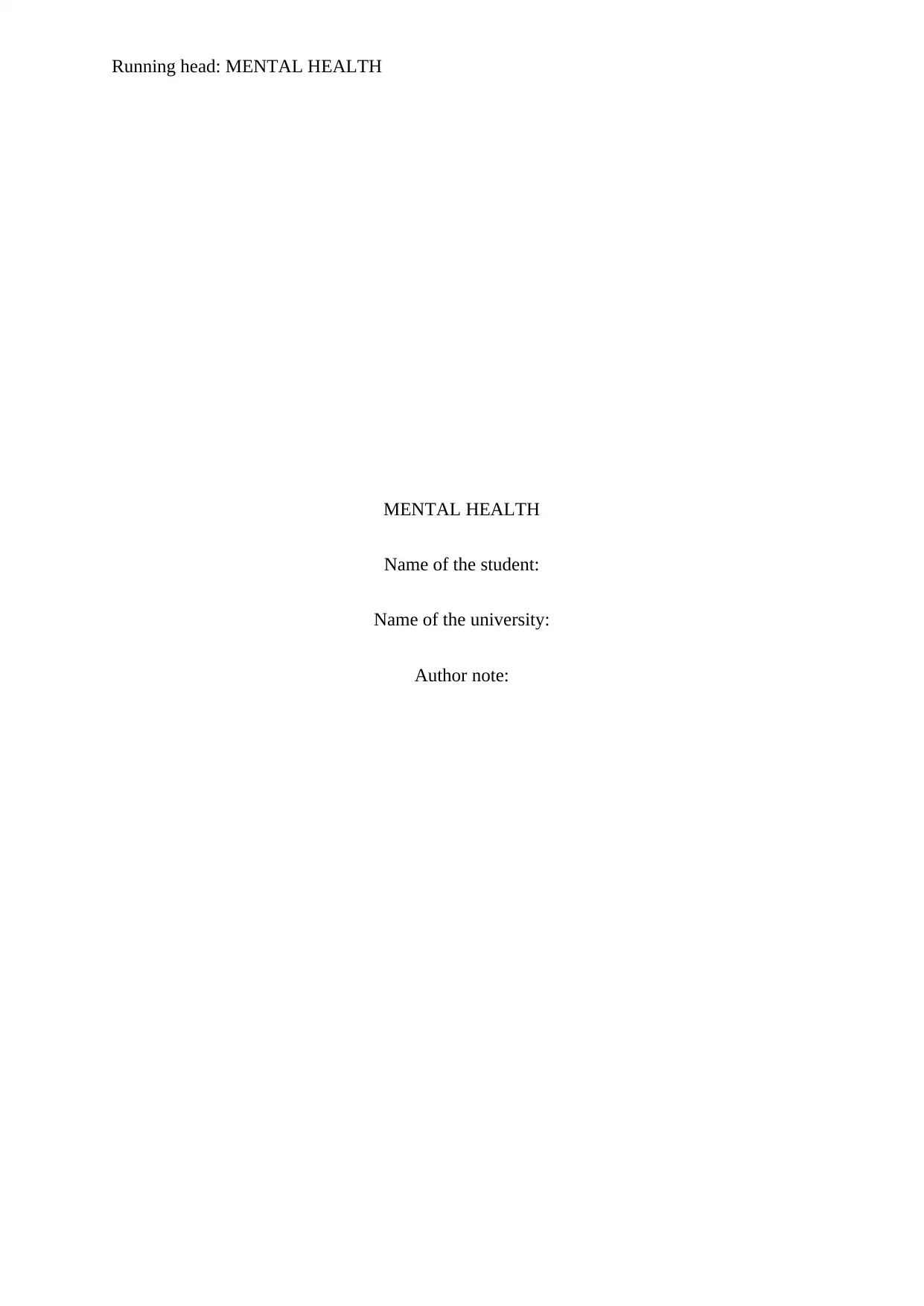
Running head: MENTAL HEALTH
MENTAL HEALTH
Name of the student:
Name of the university:
Author note:
MENTAL HEALTH
Name of the student:
Name of the university:
Author note:
Paraphrase This Document
Need a fresh take? Get an instant paraphrase of this document with our AI Paraphraser
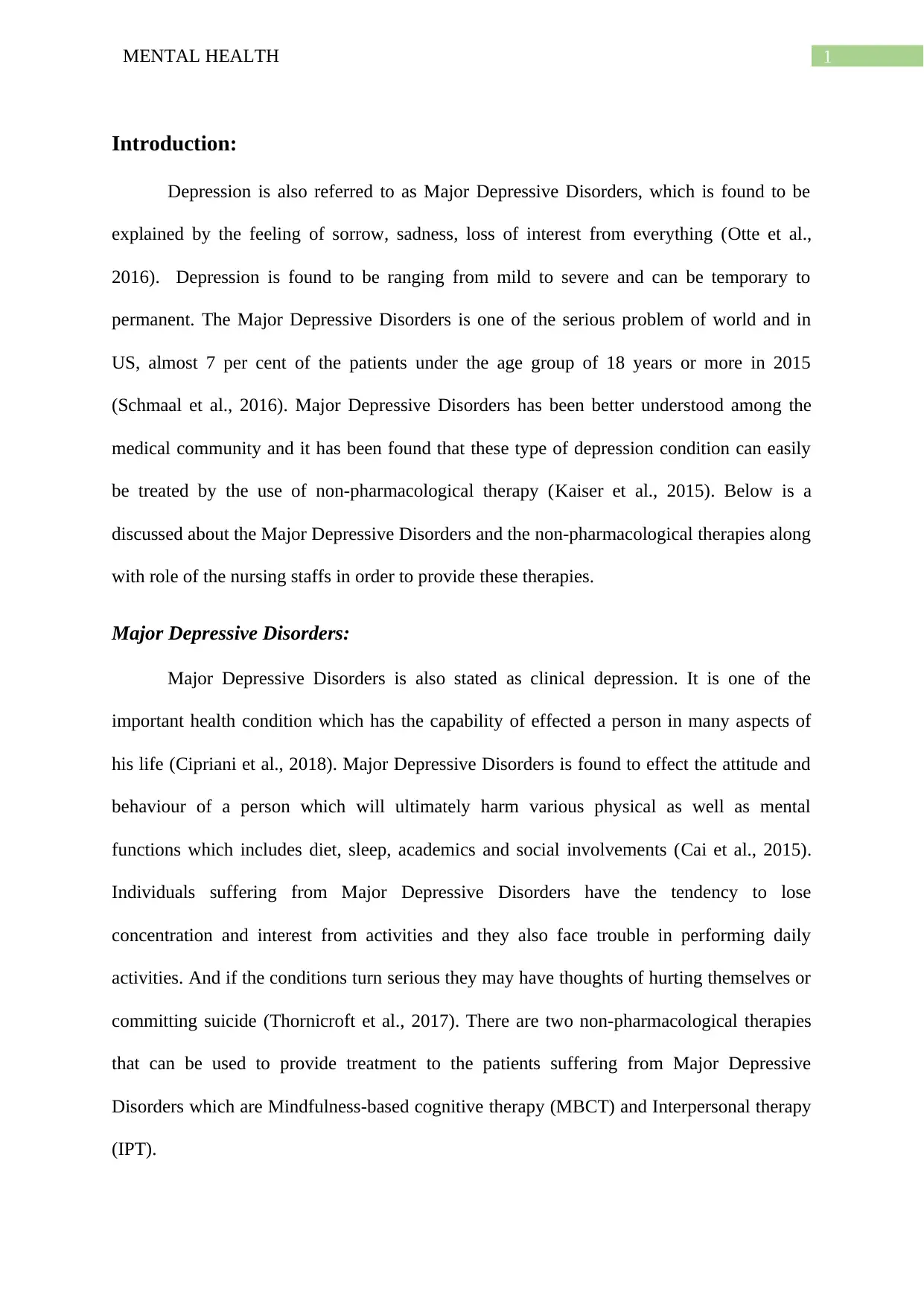
1MENTAL HEALTH
Introduction:
Depression is also referred to as Major Depressive Disorders, which is found to be
explained by the feeling of sorrow, sadness, loss of interest from everything (Otte et al.,
2016). Depression is found to be ranging from mild to severe and can be temporary to
permanent. The Major Depressive Disorders is one of the serious problem of world and in
US, almost 7 per cent of the patients under the age group of 18 years or more in 2015
(Schmaal et al., 2016). Major Depressive Disorders has been better understood among the
medical community and it has been found that these type of depression condition can easily
be treated by the use of non-pharmacological therapy (Kaiser et al., 2015). Below is a
discussed about the Major Depressive Disorders and the non-pharmacological therapies along
with role of the nursing staffs in order to provide these therapies.
Major Depressive Disorders:
Major Depressive Disorders is also stated as clinical depression. It is one of the
important health condition which has the capability of effected a person in many aspects of
his life (Cipriani et al., 2018). Major Depressive Disorders is found to effect the attitude and
behaviour of a person which will ultimately harm various physical as well as mental
functions which includes diet, sleep, academics and social involvements (Cai et al., 2015).
Individuals suffering from Major Depressive Disorders have the tendency to lose
concentration and interest from activities and they also face trouble in performing daily
activities. And if the conditions turn serious they may have thoughts of hurting themselves or
committing suicide (Thornicroft et al., 2017). There are two non-pharmacological therapies
that can be used to provide treatment to the patients suffering from Major Depressive
Disorders which are Mindfulness-based cognitive therapy (MBCT) and Interpersonal therapy
(IPT).
Introduction:
Depression is also referred to as Major Depressive Disorders, which is found to be
explained by the feeling of sorrow, sadness, loss of interest from everything (Otte et al.,
2016). Depression is found to be ranging from mild to severe and can be temporary to
permanent. The Major Depressive Disorders is one of the serious problem of world and in
US, almost 7 per cent of the patients under the age group of 18 years or more in 2015
(Schmaal et al., 2016). Major Depressive Disorders has been better understood among the
medical community and it has been found that these type of depression condition can easily
be treated by the use of non-pharmacological therapy (Kaiser et al., 2015). Below is a
discussed about the Major Depressive Disorders and the non-pharmacological therapies along
with role of the nursing staffs in order to provide these therapies.
Major Depressive Disorders:
Major Depressive Disorders is also stated as clinical depression. It is one of the
important health condition which has the capability of effected a person in many aspects of
his life (Cipriani et al., 2018). Major Depressive Disorders is found to effect the attitude and
behaviour of a person which will ultimately harm various physical as well as mental
functions which includes diet, sleep, academics and social involvements (Cai et al., 2015).
Individuals suffering from Major Depressive Disorders have the tendency to lose
concentration and interest from activities and they also face trouble in performing daily
activities. And if the conditions turn serious they may have thoughts of hurting themselves or
committing suicide (Thornicroft et al., 2017). There are two non-pharmacological therapies
that can be used to provide treatment to the patients suffering from Major Depressive
Disorders which are Mindfulness-based cognitive therapy (MBCT) and Interpersonal therapy
(IPT).
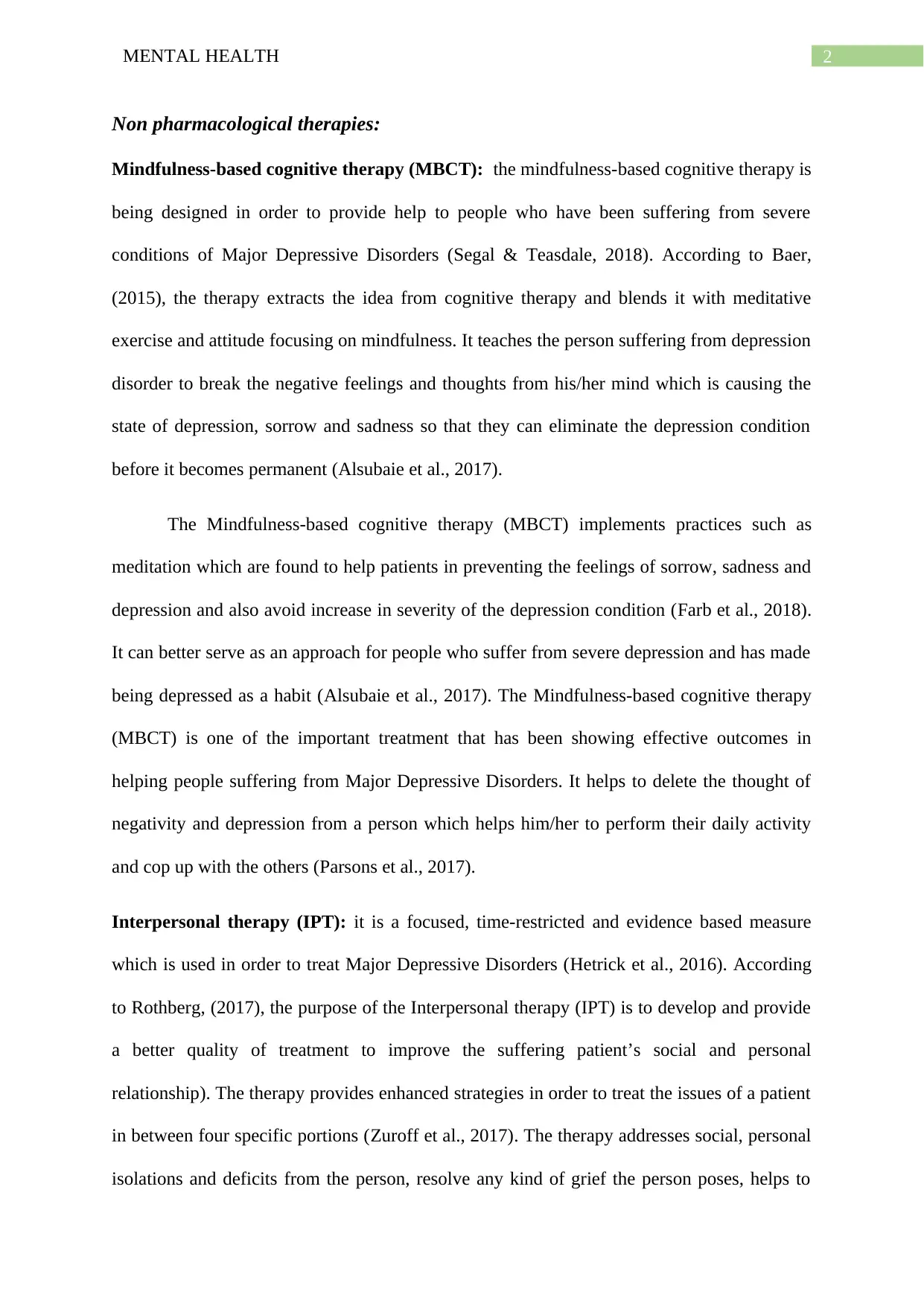
2MENTAL HEALTH
Non pharmacological therapies:
Mindfulness-based cognitive therapy (MBCT): the mindfulness-based cognitive therapy is
being designed in order to provide help to people who have been suffering from severe
conditions of Major Depressive Disorders (Segal & Teasdale, 2018). According to Baer,
(2015), the therapy extracts the idea from cognitive therapy and blends it with meditative
exercise and attitude focusing on mindfulness. It teaches the person suffering from depression
disorder to break the negative feelings and thoughts from his/her mind which is causing the
state of depression, sorrow and sadness so that they can eliminate the depression condition
before it becomes permanent (Alsubaie et al., 2017).
The Mindfulness-based cognitive therapy (MBCT) implements practices such as
meditation which are found to help patients in preventing the feelings of sorrow, sadness and
depression and also avoid increase in severity of the depression condition (Farb et al., 2018).
It can better serve as an approach for people who suffer from severe depression and has made
being depressed as a habit (Alsubaie et al., 2017). The Mindfulness-based cognitive therapy
(MBCT) is one of the important treatment that has been showing effective outcomes in
helping people suffering from Major Depressive Disorders. It helps to delete the thought of
negativity and depression from a person which helps him/her to perform their daily activity
and cop up with the others (Parsons et al., 2017).
Interpersonal therapy (IPT): it is a focused, time-restricted and evidence based measure
which is used in order to treat Major Depressive Disorders (Hetrick et al., 2016). According
to Rothberg, (2017), the purpose of the Interpersonal therapy (IPT) is to develop and provide
a better quality of treatment to improve the suffering patient’s social and personal
relationship). The therapy provides enhanced strategies in order to treat the issues of a patient
in between four specific portions (Zuroff et al., 2017). The therapy addresses social, personal
isolations and deficits from the person, resolve any kind of grief the person poses, helps to
Non pharmacological therapies:
Mindfulness-based cognitive therapy (MBCT): the mindfulness-based cognitive therapy is
being designed in order to provide help to people who have been suffering from severe
conditions of Major Depressive Disorders (Segal & Teasdale, 2018). According to Baer,
(2015), the therapy extracts the idea from cognitive therapy and blends it with meditative
exercise and attitude focusing on mindfulness. It teaches the person suffering from depression
disorder to break the negative feelings and thoughts from his/her mind which is causing the
state of depression, sorrow and sadness so that they can eliminate the depression condition
before it becomes permanent (Alsubaie et al., 2017).
The Mindfulness-based cognitive therapy (MBCT) implements practices such as
meditation which are found to help patients in preventing the feelings of sorrow, sadness and
depression and also avoid increase in severity of the depression condition (Farb et al., 2018).
It can better serve as an approach for people who suffer from severe depression and has made
being depressed as a habit (Alsubaie et al., 2017). The Mindfulness-based cognitive therapy
(MBCT) is one of the important treatment that has been showing effective outcomes in
helping people suffering from Major Depressive Disorders. It helps to delete the thought of
negativity and depression from a person which helps him/her to perform their daily activity
and cop up with the others (Parsons et al., 2017).
Interpersonal therapy (IPT): it is a focused, time-restricted and evidence based measure
which is used in order to treat Major Depressive Disorders (Hetrick et al., 2016). According
to Rothberg, (2017), the purpose of the Interpersonal therapy (IPT) is to develop and provide
a better quality of treatment to improve the suffering patient’s social and personal
relationship). The therapy provides enhanced strategies in order to treat the issues of a patient
in between four specific portions (Zuroff et al., 2017). The therapy addresses social, personal
isolations and deficits from the person, resolve any kind of grief the person poses, helps to
⊘ This is a preview!⊘
Do you want full access?
Subscribe today to unlock all pages.

Trusted by 1+ million students worldwide
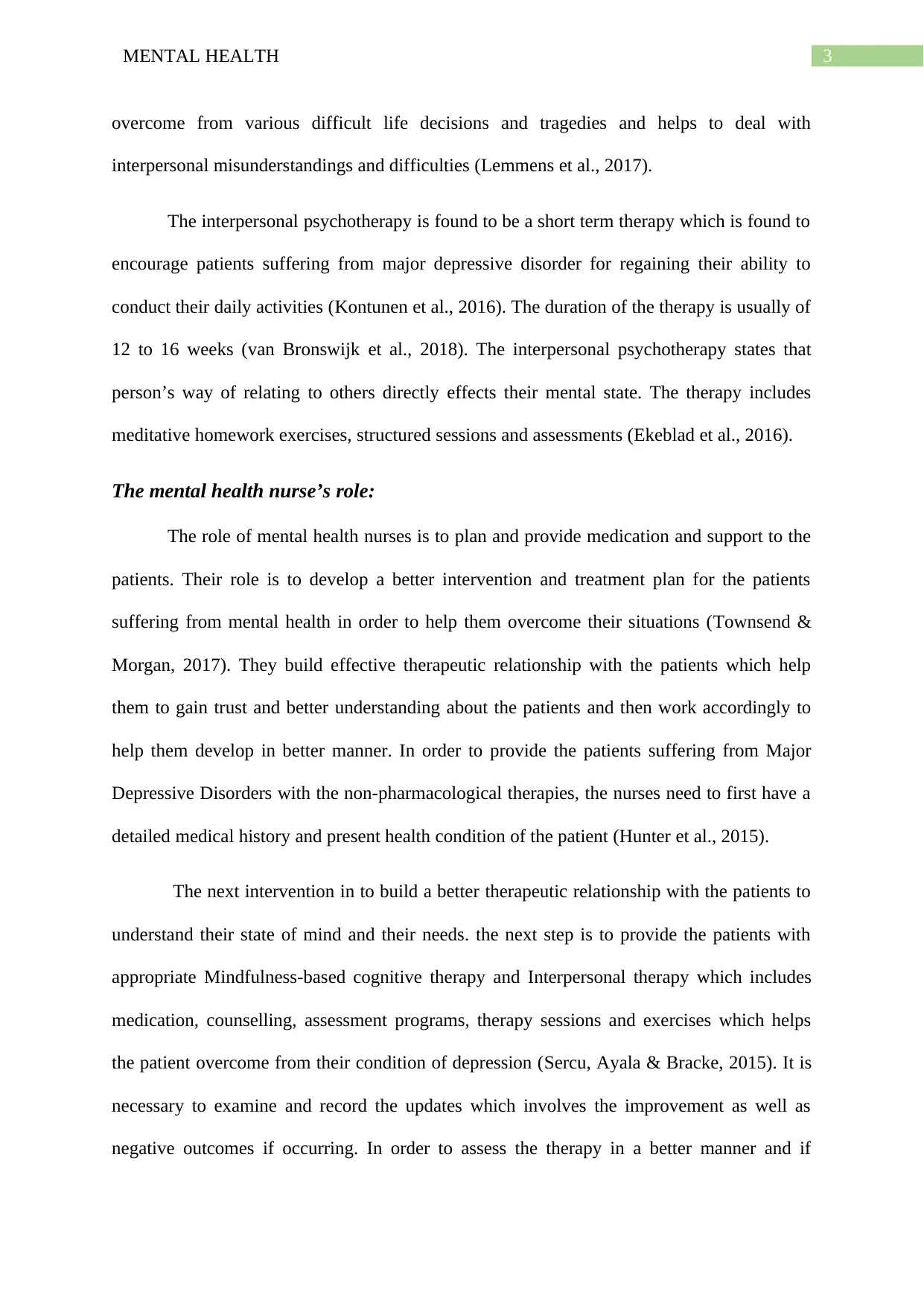
3MENTAL HEALTH
overcome from various difficult life decisions and tragedies and helps to deal with
interpersonal misunderstandings and difficulties (Lemmens et al., 2017).
The interpersonal psychotherapy is found to be a short term therapy which is found to
encourage patients suffering from major depressive disorder for regaining their ability to
conduct their daily activities (Kontunen et al., 2016). The duration of the therapy is usually of
12 to 16 weeks (van Bronswijk et al., 2018). The interpersonal psychotherapy states that
person’s way of relating to others directly effects their mental state. The therapy includes
meditative homework exercises, structured sessions and assessments (Ekeblad et al., 2016).
The mental health nurse’s role:
The role of mental health nurses is to plan and provide medication and support to the
patients. Their role is to develop a better intervention and treatment plan for the patients
suffering from mental health in order to help them overcome their situations (Townsend &
Morgan, 2017). They build effective therapeutic relationship with the patients which help
them to gain trust and better understanding about the patients and then work accordingly to
help them develop in better manner. In order to provide the patients suffering from Major
Depressive Disorders with the non-pharmacological therapies, the nurses need to first have a
detailed medical history and present health condition of the patient (Hunter et al., 2015).
The next intervention in to build a better therapeutic relationship with the patients to
understand their state of mind and their needs. the next step is to provide the patients with
appropriate Mindfulness-based cognitive therapy and Interpersonal therapy which includes
medication, counselling, assessment programs, therapy sessions and exercises which helps
the patient overcome from their condition of depression (Sercu, Ayala & Bracke, 2015). It is
necessary to examine and record the updates which involves the improvement as well as
negative outcomes if occurring. In order to assess the therapy in a better manner and if
overcome from various difficult life decisions and tragedies and helps to deal with
interpersonal misunderstandings and difficulties (Lemmens et al., 2017).
The interpersonal psychotherapy is found to be a short term therapy which is found to
encourage patients suffering from major depressive disorder for regaining their ability to
conduct their daily activities (Kontunen et al., 2016). The duration of the therapy is usually of
12 to 16 weeks (van Bronswijk et al., 2018). The interpersonal psychotherapy states that
person’s way of relating to others directly effects their mental state. The therapy includes
meditative homework exercises, structured sessions and assessments (Ekeblad et al., 2016).
The mental health nurse’s role:
The role of mental health nurses is to plan and provide medication and support to the
patients. Their role is to develop a better intervention and treatment plan for the patients
suffering from mental health in order to help them overcome their situations (Townsend &
Morgan, 2017). They build effective therapeutic relationship with the patients which help
them to gain trust and better understanding about the patients and then work accordingly to
help them develop in better manner. In order to provide the patients suffering from Major
Depressive Disorders with the non-pharmacological therapies, the nurses need to first have a
detailed medical history and present health condition of the patient (Hunter et al., 2015).
The next intervention in to build a better therapeutic relationship with the patients to
understand their state of mind and their needs. the next step is to provide the patients with
appropriate Mindfulness-based cognitive therapy and Interpersonal therapy which includes
medication, counselling, assessment programs, therapy sessions and exercises which helps
the patient overcome from their condition of depression (Sercu, Ayala & Bracke, 2015). It is
necessary to examine and record the updates which involves the improvement as well as
negative outcomes if occurring. In order to assess the therapy in a better manner and if
Paraphrase This Document
Need a fresh take? Get an instant paraphrase of this document with our AI Paraphraser
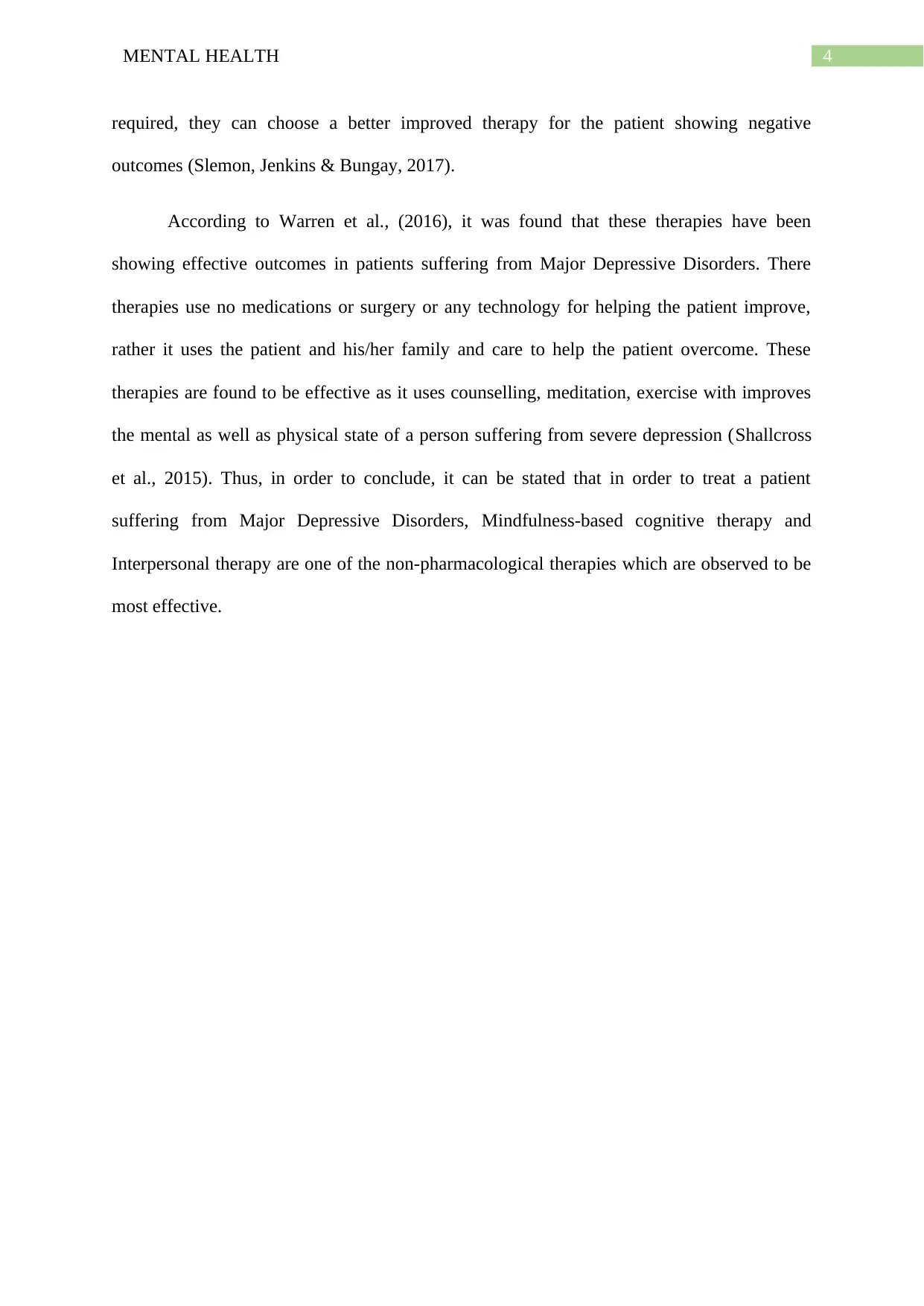
4MENTAL HEALTH
required, they can choose a better improved therapy for the patient showing negative
outcomes (Slemon, Jenkins & Bungay, 2017).
According to Warren et al., (2016), it was found that these therapies have been
showing effective outcomes in patients suffering from Major Depressive Disorders. There
therapies use no medications or surgery or any technology for helping the patient improve,
rather it uses the patient and his/her family and care to help the patient overcome. These
therapies are found to be effective as it uses counselling, meditation, exercise with improves
the mental as well as physical state of a person suffering from severe depression (Shallcross
et al., 2015). Thus, in order to conclude, it can be stated that in order to treat a patient
suffering from Major Depressive Disorders, Mindfulness-based cognitive therapy and
Interpersonal therapy are one of the non-pharmacological therapies which are observed to be
most effective.
required, they can choose a better improved therapy for the patient showing negative
outcomes (Slemon, Jenkins & Bungay, 2017).
According to Warren et al., (2016), it was found that these therapies have been
showing effective outcomes in patients suffering from Major Depressive Disorders. There
therapies use no medications or surgery or any technology for helping the patient improve,
rather it uses the patient and his/her family and care to help the patient overcome. These
therapies are found to be effective as it uses counselling, meditation, exercise with improves
the mental as well as physical state of a person suffering from severe depression (Shallcross
et al., 2015). Thus, in order to conclude, it can be stated that in order to treat a patient
suffering from Major Depressive Disorders, Mindfulness-based cognitive therapy and
Interpersonal therapy are one of the non-pharmacological therapies which are observed to be
most effective.
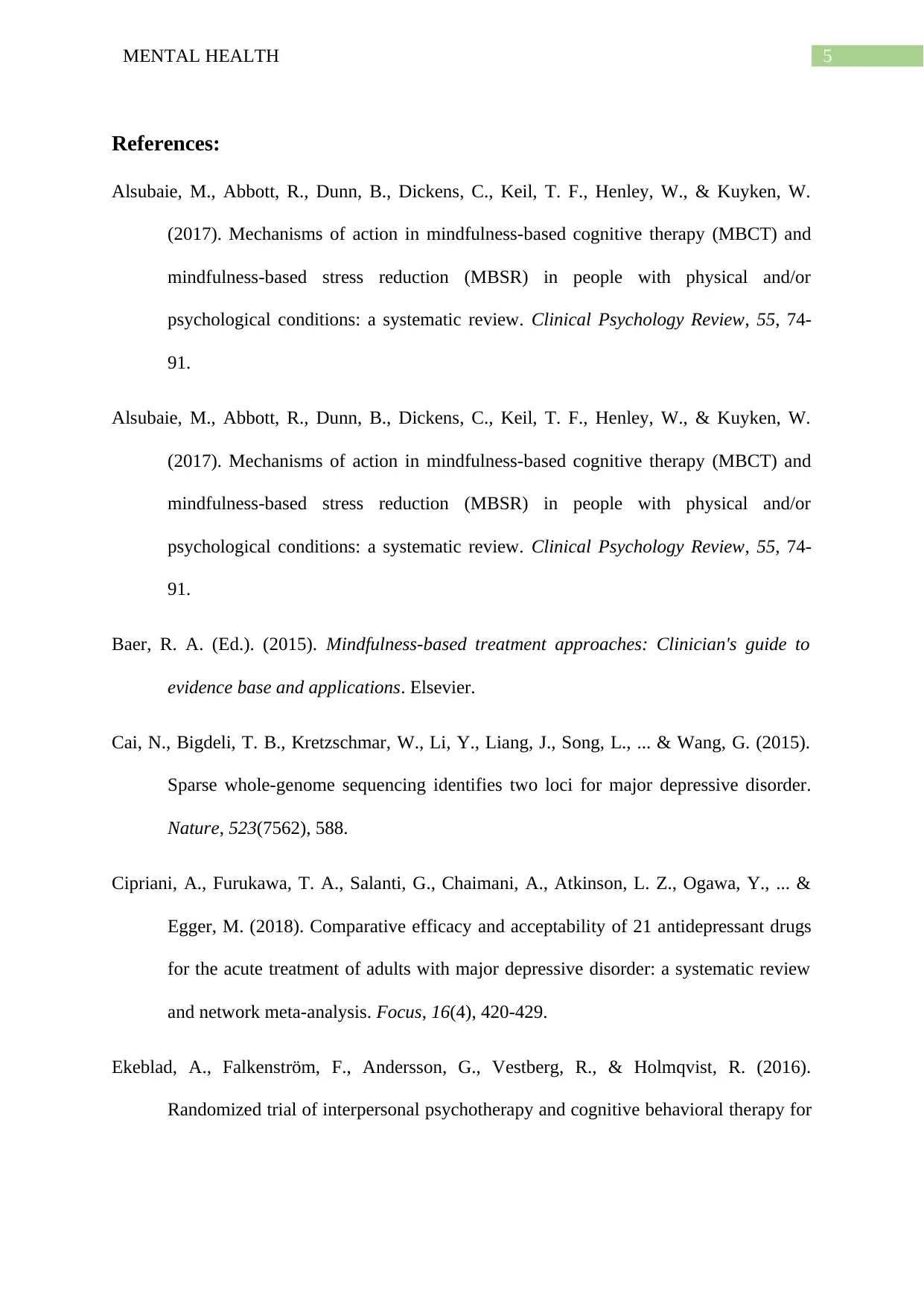
5MENTAL HEALTH
References:
Alsubaie, M., Abbott, R., Dunn, B., Dickens, C., Keil, T. F., Henley, W., & Kuyken, W.
(2017). Mechanisms of action in mindfulness-based cognitive therapy (MBCT) and
mindfulness-based stress reduction (MBSR) in people with physical and/or
psychological conditions: a systematic review. Clinical Psychology Review, 55, 74-
91.
Alsubaie, M., Abbott, R., Dunn, B., Dickens, C., Keil, T. F., Henley, W., & Kuyken, W.
(2017). Mechanisms of action in mindfulness-based cognitive therapy (MBCT) and
mindfulness-based stress reduction (MBSR) in people with physical and/or
psychological conditions: a systematic review. Clinical Psychology Review, 55, 74-
91.
Baer, R. A. (Ed.). (2015). Mindfulness-based treatment approaches: Clinician's guide to
evidence base and applications. Elsevier.
Cai, N., Bigdeli, T. B., Kretzschmar, W., Li, Y., Liang, J., Song, L., ... & Wang, G. (2015).
Sparse whole-genome sequencing identifies two loci for major depressive disorder.
Nature, 523(7562), 588.
Cipriani, A., Furukawa, T. A., Salanti, G., Chaimani, A., Atkinson, L. Z., Ogawa, Y., ... &
Egger, M. (2018). Comparative efficacy and acceptability of 21 antidepressant drugs
for the acute treatment of adults with major depressive disorder: a systematic review
and network meta-analysis. Focus, 16(4), 420-429.
Ekeblad, A., Falkenström, F., Andersson, G., Vestberg, R., & Holmqvist, R. (2016).
Randomized trial of interpersonal psychotherapy and cognitive behavioral therapy for
References:
Alsubaie, M., Abbott, R., Dunn, B., Dickens, C., Keil, T. F., Henley, W., & Kuyken, W.
(2017). Mechanisms of action in mindfulness-based cognitive therapy (MBCT) and
mindfulness-based stress reduction (MBSR) in people with physical and/or
psychological conditions: a systematic review. Clinical Psychology Review, 55, 74-
91.
Alsubaie, M., Abbott, R., Dunn, B., Dickens, C., Keil, T. F., Henley, W., & Kuyken, W.
(2017). Mechanisms of action in mindfulness-based cognitive therapy (MBCT) and
mindfulness-based stress reduction (MBSR) in people with physical and/or
psychological conditions: a systematic review. Clinical Psychology Review, 55, 74-
91.
Baer, R. A. (Ed.). (2015). Mindfulness-based treatment approaches: Clinician's guide to
evidence base and applications. Elsevier.
Cai, N., Bigdeli, T. B., Kretzschmar, W., Li, Y., Liang, J., Song, L., ... & Wang, G. (2015).
Sparse whole-genome sequencing identifies two loci for major depressive disorder.
Nature, 523(7562), 588.
Cipriani, A., Furukawa, T. A., Salanti, G., Chaimani, A., Atkinson, L. Z., Ogawa, Y., ... &
Egger, M. (2018). Comparative efficacy and acceptability of 21 antidepressant drugs
for the acute treatment of adults with major depressive disorder: a systematic review
and network meta-analysis. Focus, 16(4), 420-429.
Ekeblad, A., Falkenström, F., Andersson, G., Vestberg, R., & Holmqvist, R. (2016).
Randomized trial of interpersonal psychotherapy and cognitive behavioral therapy for
⊘ This is a preview!⊘
Do you want full access?
Subscribe today to unlock all pages.

Trusted by 1+ million students worldwide
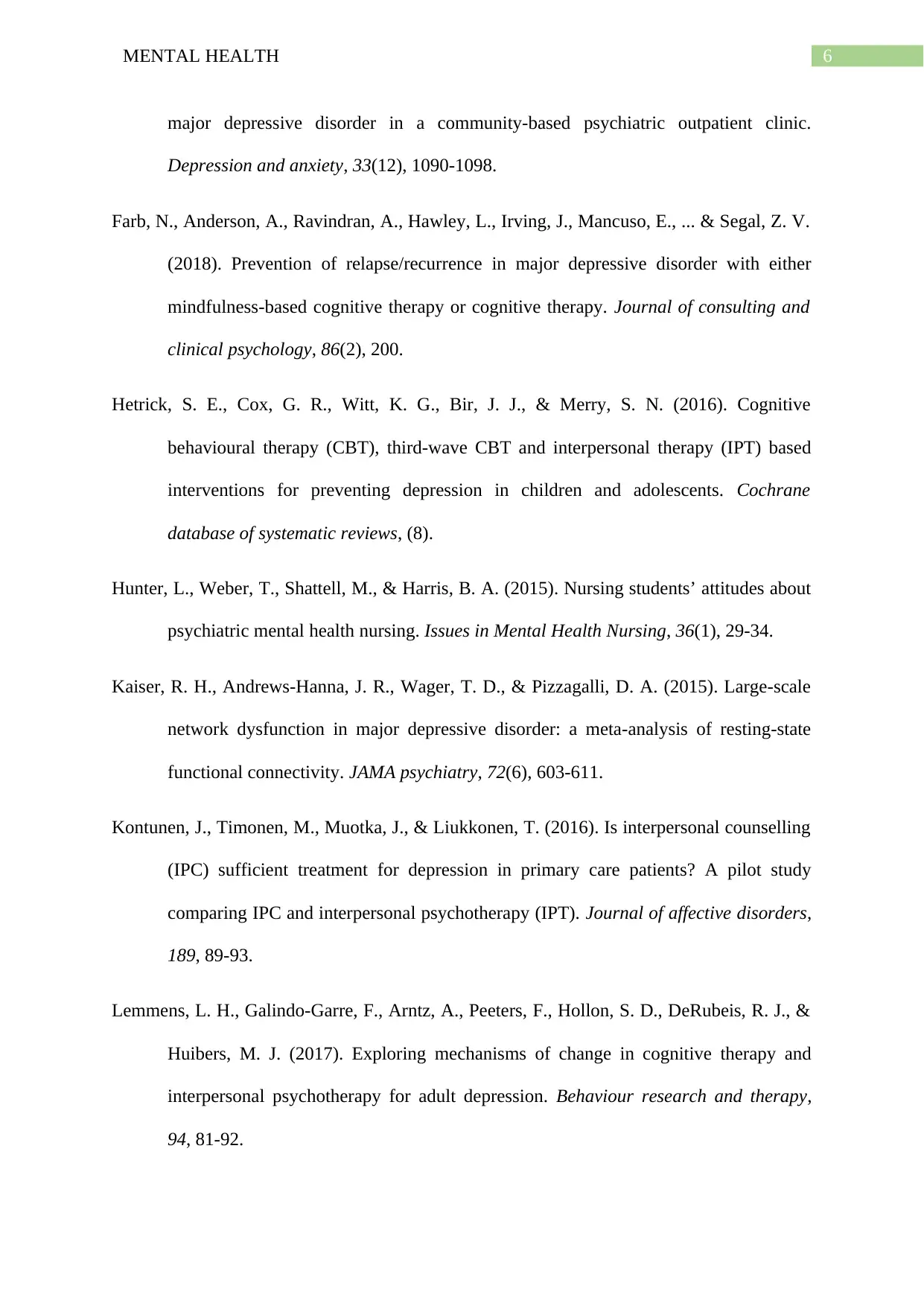
6MENTAL HEALTH
major depressive disorder in a community‐based psychiatric outpatient clinic.
Depression and anxiety, 33(12), 1090-1098.
Farb, N., Anderson, A., Ravindran, A., Hawley, L., Irving, J., Mancuso, E., ... & Segal, Z. V.
(2018). Prevention of relapse/recurrence in major depressive disorder with either
mindfulness-based cognitive therapy or cognitive therapy. Journal of consulting and
clinical psychology, 86(2), 200.
Hetrick, S. E., Cox, G. R., Witt, K. G., Bir, J. J., & Merry, S. N. (2016). Cognitive
behavioural therapy (CBT), third‐wave CBT and interpersonal therapy (IPT) based
interventions for preventing depression in children and adolescents. Cochrane
database of systematic reviews, (8).
Hunter, L., Weber, T., Shattell, M., & Harris, B. A. (2015). Nursing students’ attitudes about
psychiatric mental health nursing. Issues in Mental Health Nursing, 36(1), 29-34.
Kaiser, R. H., Andrews-Hanna, J. R., Wager, T. D., & Pizzagalli, D. A. (2015). Large-scale
network dysfunction in major depressive disorder: a meta-analysis of resting-state
functional connectivity. JAMA psychiatry, 72(6), 603-611.
Kontunen, J., Timonen, M., Muotka, J., & Liukkonen, T. (2016). Is interpersonal counselling
(IPC) sufficient treatment for depression in primary care patients? A pilot study
comparing IPC and interpersonal psychotherapy (IPT). Journal of affective disorders,
189, 89-93.
Lemmens, L. H., Galindo-Garre, F., Arntz, A., Peeters, F., Hollon, S. D., DeRubeis, R. J., &
Huibers, M. J. (2017). Exploring mechanisms of change in cognitive therapy and
interpersonal psychotherapy for adult depression. Behaviour research and therapy,
94, 81-92.
major depressive disorder in a community‐based psychiatric outpatient clinic.
Depression and anxiety, 33(12), 1090-1098.
Farb, N., Anderson, A., Ravindran, A., Hawley, L., Irving, J., Mancuso, E., ... & Segal, Z. V.
(2018). Prevention of relapse/recurrence in major depressive disorder with either
mindfulness-based cognitive therapy or cognitive therapy. Journal of consulting and
clinical psychology, 86(2), 200.
Hetrick, S. E., Cox, G. R., Witt, K. G., Bir, J. J., & Merry, S. N. (2016). Cognitive
behavioural therapy (CBT), third‐wave CBT and interpersonal therapy (IPT) based
interventions for preventing depression in children and adolescents. Cochrane
database of systematic reviews, (8).
Hunter, L., Weber, T., Shattell, M., & Harris, B. A. (2015). Nursing students’ attitudes about
psychiatric mental health nursing. Issues in Mental Health Nursing, 36(1), 29-34.
Kaiser, R. H., Andrews-Hanna, J. R., Wager, T. D., & Pizzagalli, D. A. (2015). Large-scale
network dysfunction in major depressive disorder: a meta-analysis of resting-state
functional connectivity. JAMA psychiatry, 72(6), 603-611.
Kontunen, J., Timonen, M., Muotka, J., & Liukkonen, T. (2016). Is interpersonal counselling
(IPC) sufficient treatment for depression in primary care patients? A pilot study
comparing IPC and interpersonal psychotherapy (IPT). Journal of affective disorders,
189, 89-93.
Lemmens, L. H., Galindo-Garre, F., Arntz, A., Peeters, F., Hollon, S. D., DeRubeis, R. J., &
Huibers, M. J. (2017). Exploring mechanisms of change in cognitive therapy and
interpersonal psychotherapy for adult depression. Behaviour research and therapy,
94, 81-92.
Paraphrase This Document
Need a fresh take? Get an instant paraphrase of this document with our AI Paraphraser
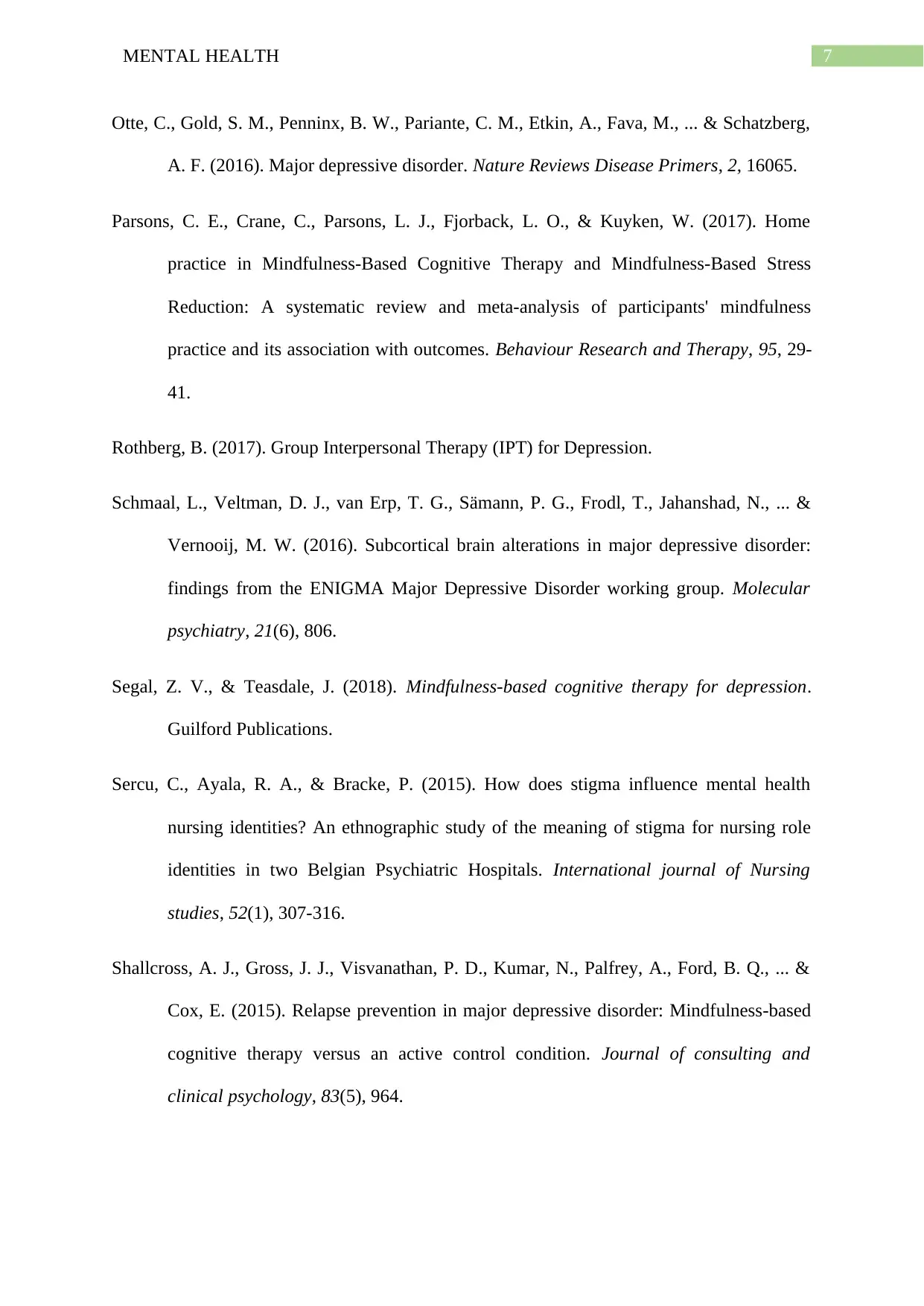
7MENTAL HEALTH
Otte, C., Gold, S. M., Penninx, B. W., Pariante, C. M., Etkin, A., Fava, M., ... & Schatzberg,
A. F. (2016). Major depressive disorder. Nature Reviews Disease Primers, 2, 16065.
Parsons, C. E., Crane, C., Parsons, L. J., Fjorback, L. O., & Kuyken, W. (2017). Home
practice in Mindfulness-Based Cognitive Therapy and Mindfulness-Based Stress
Reduction: A systematic review and meta-analysis of participants' mindfulness
practice and its association with outcomes. Behaviour Research and Therapy, 95, 29-
41.
Rothberg, B. (2017). Group Interpersonal Therapy (IPT) for Depression.
Schmaal, L., Veltman, D. J., van Erp, T. G., Sämann, P. G., Frodl, T., Jahanshad, N., ... &
Vernooij, M. W. (2016). Subcortical brain alterations in major depressive disorder:
findings from the ENIGMA Major Depressive Disorder working group. Molecular
psychiatry, 21(6), 806.
Segal, Z. V., & Teasdale, J. (2018). Mindfulness-based cognitive therapy for depression.
Guilford Publications.
Sercu, C., Ayala, R. A., & Bracke, P. (2015). How does stigma influence mental health
nursing identities? An ethnographic study of the meaning of stigma for nursing role
identities in two Belgian Psychiatric Hospitals. International journal of Nursing
studies, 52(1), 307-316.
Shallcross, A. J., Gross, J. J., Visvanathan, P. D., Kumar, N., Palfrey, A., Ford, B. Q., ... &
Cox, E. (2015). Relapse prevention in major depressive disorder: Mindfulness-based
cognitive therapy versus an active control condition. Journal of consulting and
clinical psychology, 83(5), 964.
Otte, C., Gold, S. M., Penninx, B. W., Pariante, C. M., Etkin, A., Fava, M., ... & Schatzberg,
A. F. (2016). Major depressive disorder. Nature Reviews Disease Primers, 2, 16065.
Parsons, C. E., Crane, C., Parsons, L. J., Fjorback, L. O., & Kuyken, W. (2017). Home
practice in Mindfulness-Based Cognitive Therapy and Mindfulness-Based Stress
Reduction: A systematic review and meta-analysis of participants' mindfulness
practice and its association with outcomes. Behaviour Research and Therapy, 95, 29-
41.
Rothberg, B. (2017). Group Interpersonal Therapy (IPT) for Depression.
Schmaal, L., Veltman, D. J., van Erp, T. G., Sämann, P. G., Frodl, T., Jahanshad, N., ... &
Vernooij, M. W. (2016). Subcortical brain alterations in major depressive disorder:
findings from the ENIGMA Major Depressive Disorder working group. Molecular
psychiatry, 21(6), 806.
Segal, Z. V., & Teasdale, J. (2018). Mindfulness-based cognitive therapy for depression.
Guilford Publications.
Sercu, C., Ayala, R. A., & Bracke, P. (2015). How does stigma influence mental health
nursing identities? An ethnographic study of the meaning of stigma for nursing role
identities in two Belgian Psychiatric Hospitals. International journal of Nursing
studies, 52(1), 307-316.
Shallcross, A. J., Gross, J. J., Visvanathan, P. D., Kumar, N., Palfrey, A., Ford, B. Q., ... &
Cox, E. (2015). Relapse prevention in major depressive disorder: Mindfulness-based
cognitive therapy versus an active control condition. Journal of consulting and
clinical psychology, 83(5), 964.
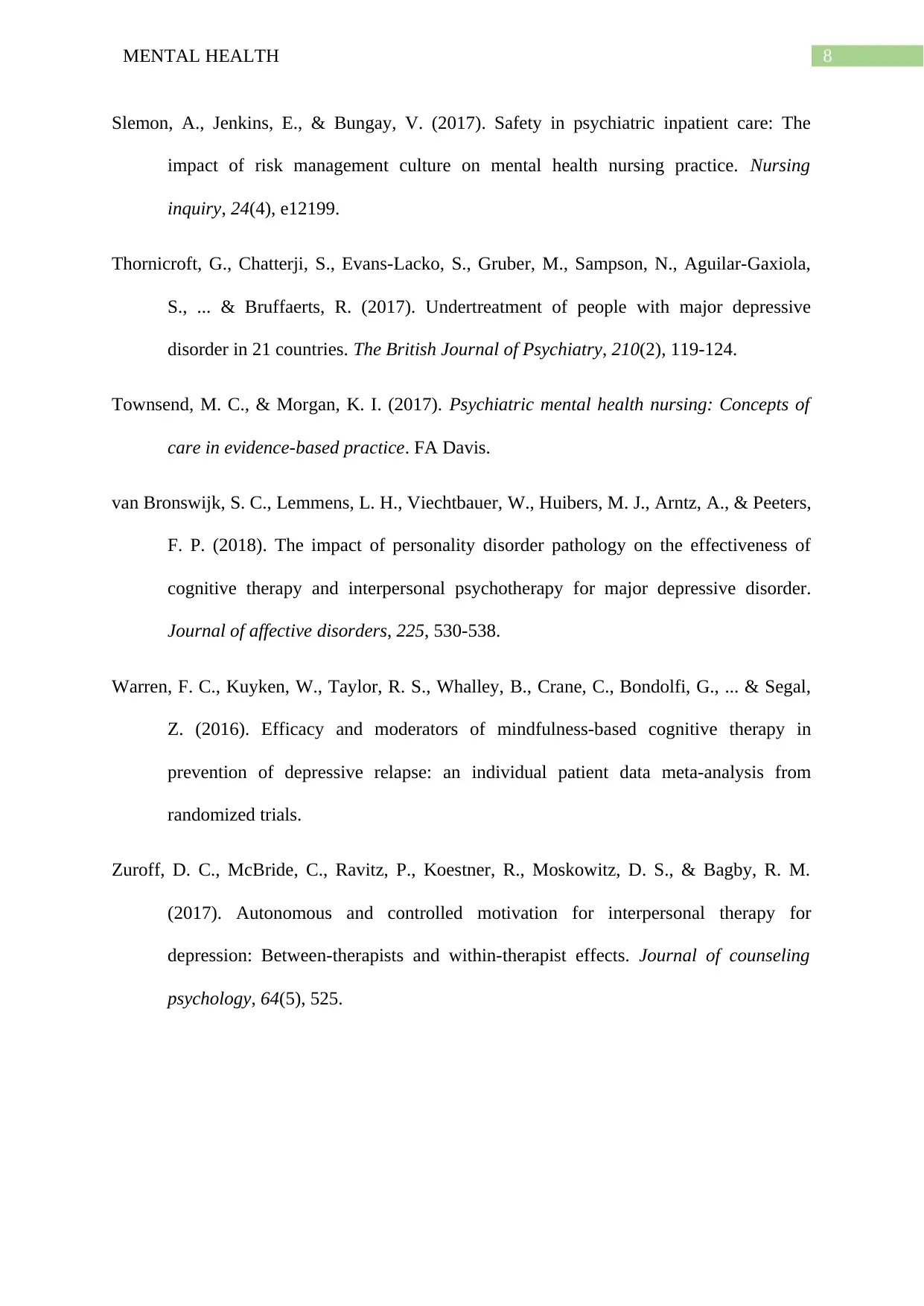
8MENTAL HEALTH
Slemon, A., Jenkins, E., & Bungay, V. (2017). Safety in psychiatric inpatient care: The
impact of risk management culture on mental health nursing practice. Nursing
inquiry, 24(4), e12199.
Thornicroft, G., Chatterji, S., Evans-Lacko, S., Gruber, M., Sampson, N., Aguilar-Gaxiola,
S., ... & Bruffaerts, R. (2017). Undertreatment of people with major depressive
disorder in 21 countries. The British Journal of Psychiatry, 210(2), 119-124.
Townsend, M. C., & Morgan, K. I. (2017). Psychiatric mental health nursing: Concepts of
care in evidence-based practice. FA Davis.
van Bronswijk, S. C., Lemmens, L. H., Viechtbauer, W., Huibers, M. J., Arntz, A., & Peeters,
F. P. (2018). The impact of personality disorder pathology on the effectiveness of
cognitive therapy and interpersonal psychotherapy for major depressive disorder.
Journal of affective disorders, 225, 530-538.
Warren, F. C., Kuyken, W., Taylor, R. S., Whalley, B., Crane, C., Bondolfi, G., ... & Segal,
Z. (2016). Efficacy and moderators of mindfulness-based cognitive therapy in
prevention of depressive relapse: an individual patient data meta-analysis from
randomized trials.
Zuroff, D. C., McBride, C., Ravitz, P., Koestner, R., Moskowitz, D. S., & Bagby, R. M.
(2017). Autonomous and controlled motivation for interpersonal therapy for
depression: Between-therapists and within-therapist effects. Journal of counseling
psychology, 64(5), 525.
Slemon, A., Jenkins, E., & Bungay, V. (2017). Safety in psychiatric inpatient care: The
impact of risk management culture on mental health nursing practice. Nursing
inquiry, 24(4), e12199.
Thornicroft, G., Chatterji, S., Evans-Lacko, S., Gruber, M., Sampson, N., Aguilar-Gaxiola,
S., ... & Bruffaerts, R. (2017). Undertreatment of people with major depressive
disorder in 21 countries. The British Journal of Psychiatry, 210(2), 119-124.
Townsend, M. C., & Morgan, K. I. (2017). Psychiatric mental health nursing: Concepts of
care in evidence-based practice. FA Davis.
van Bronswijk, S. C., Lemmens, L. H., Viechtbauer, W., Huibers, M. J., Arntz, A., & Peeters,
F. P. (2018). The impact of personality disorder pathology on the effectiveness of
cognitive therapy and interpersonal psychotherapy for major depressive disorder.
Journal of affective disorders, 225, 530-538.
Warren, F. C., Kuyken, W., Taylor, R. S., Whalley, B., Crane, C., Bondolfi, G., ... & Segal,
Z. (2016). Efficacy and moderators of mindfulness-based cognitive therapy in
prevention of depressive relapse: an individual patient data meta-analysis from
randomized trials.
Zuroff, D. C., McBride, C., Ravitz, P., Koestner, R., Moskowitz, D. S., & Bagby, R. M.
(2017). Autonomous and controlled motivation for interpersonal therapy for
depression: Between-therapists and within-therapist effects. Journal of counseling
psychology, 64(5), 525.
⊘ This is a preview!⊘
Do you want full access?
Subscribe today to unlock all pages.

Trusted by 1+ million students worldwide

9MENTAL HEALTH
1 out of 10
Related Documents
Your All-in-One AI-Powered Toolkit for Academic Success.
+13062052269
info@desklib.com
Available 24*7 on WhatsApp / Email
![[object Object]](/_next/static/media/star-bottom.7253800d.svg)
Unlock your academic potential
Copyright © 2020–2026 A2Z Services. All Rights Reserved. Developed and managed by ZUCOL.





